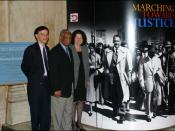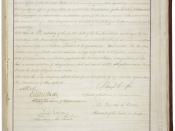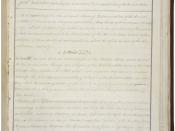Plessy v. Ferguson
14th amendment- equal protection
Argued 1896, Decided-1896
Louisiana placed a law giving separate railway cars for blacks and whites. In 1892, Homer Plessy- 7/8 Caucasian, sat in a "whites only" car of a Louisiana train, and refused to move to the car for blacks and was then arrested. The Court had to decide whether the Louisiana law was unconstitutional under the 14th amendment. The Court ruled that the state law was within its constitutional boundaries. The majority of this case supported the state-imposed racial segregation. The Court based their final decision on the separate but equal doctrine and agreed that the state had separate facilities for blacks and whites, which were equal. Brown stated that the 14th amendment was imposed to provide complete equality of races before the law. In conclusion, segregation does not constitute unlawful prejudice.
Powell v. Alabama
Argued/Decided-1932
14th amendment-Due Process, 6-right to counsel
Nine black teenagers were accused of raping two white women in Alabama.
Officials went through the legal proceedings in a total of three trials in one day and all nine were sentenced to death. The Alabama law obligated the appointment of counsel in capital cases, but the attorneys didn't talk with their clients and only showed up to represent them in trial. The case was merged with Patterson v. Alabama and Weems v. Alabama. Did the trials violate the Due Process Clause of the Fourteenth Amendment? Yes. The Court ruled that the trials deprived due process because the defendants were not given enough time to secure counsel in their defense. Justice George Sutherland noted that they didn't get the right to counsel as well. This case was an example of national constitutional defense in the field of criminal justice.
Minersville School District v. Gobitis
Argued/Decided-1940
1st/14-religion, equal protection
In Minersville,


